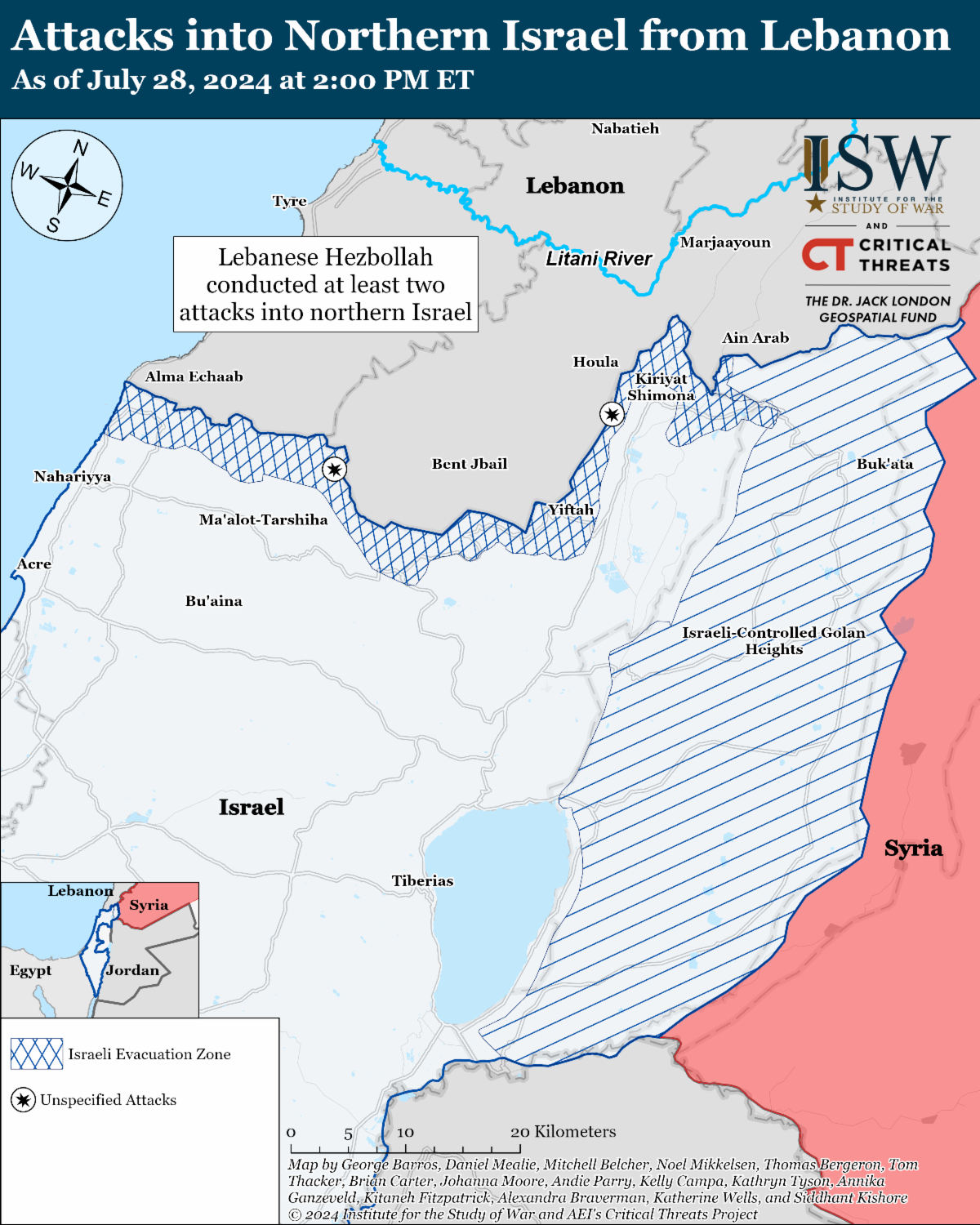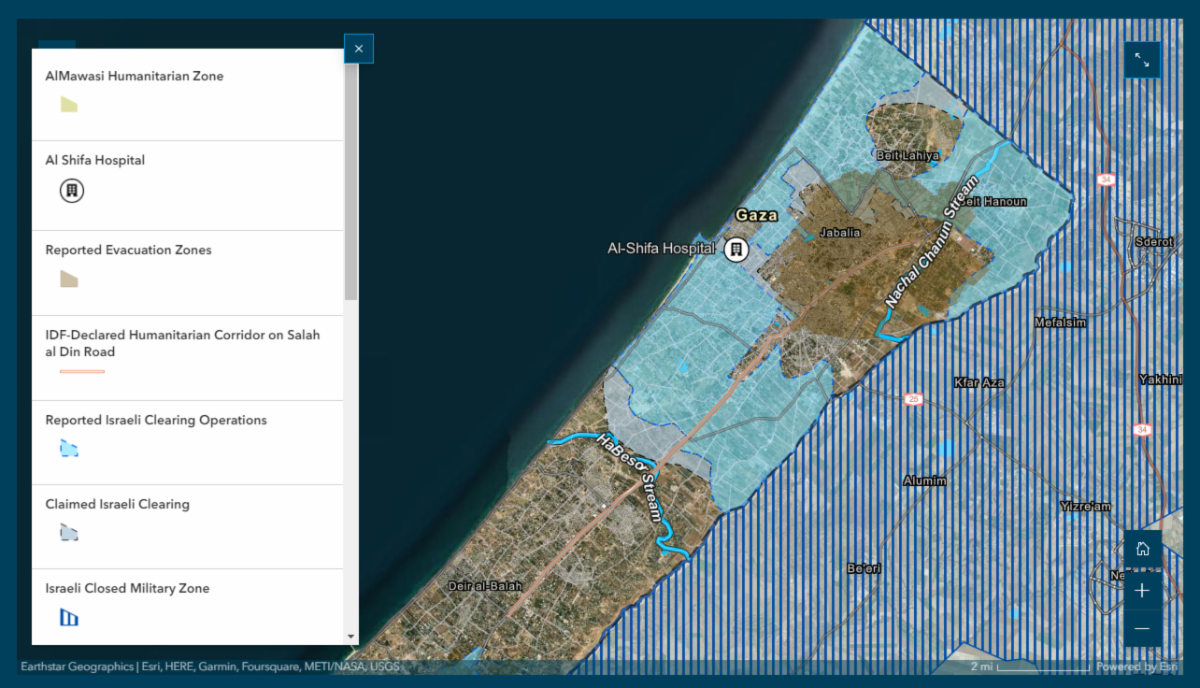Hezbollah likely conducted the July 27 rocket attack that killed 12 Israeli children in Majdal Shams, northern Israel. The IDF published a graphic on July 28 showing the Falaq-1 rocket’s flight path, which passed several hundred feet west of the IDF position at Maale Golani, 2km north of Majdal Shams. Hezbollah fired the rocket from north of Shebaa village, southern Lebanon. Hezbollah claimed two attacks targeting Maale Golani on July 27, including one attack in which Hezbollah said that it fired a Falaq-1. Hezbollah claimed the Falaq-1 attack targeting Maale Golani at 1229 ET, roughly one hour after the first reports of a rocket impact at Majdal Shams. Hezbollah attack claims frequently lag behind reports of the actual attack. Hezbollah denied that it conducted the attack on Majdal Shams and falsely claimed that the attack was the result of an Israeli Tamir Iron Dome interceptor that hit Majdal Shams. The IDF found debris of an Iranian-made Falaq-1 rocket in Majdal Shams, and the IDF reported that only Hezbollah uses the Falaq-1. The IDF did not fire an Iron Dome interceptor at the rocket. Other militias operating in southern Lebanon—such as Hamas elements or Jama’a al Islamiyah—could have acquired and used a Falaq-1, but CTP-ISW has not previously observed these militias using the Falaq-1.
This attack is the consequence of a long, Hezbollah-initiated campaign targeting both civilian areas and military sites in northern Israel. Hezbollah initiated the war in the north on October 8, when it began its attack campaign targeting northern Israel. This campaign caused Israel to evacuate tens of thousands of civilians from their homes in northern Israel. Hezbollah has targeted both civilian and military sites throughout the war. Hezbollah’s decision in early 2024 to transition from less-sophisticated rocket and anti-tank guided missile systems to more advanced and deadly rocket (including the Falaq-1), one-way attack drone, and anti-tank guided missile systems also increased the risk that a Hezbollah attack would cause significant Israeli casualties, either intentionally or due to a miscalculation.
Israeli political officials are currently weighing their response to this attack amid mounting domestic pressure to address Hezbollah’s attacks on northern Israel. Israeli military and political officials vowed to respond “harshly” to Hezbollah’s attack on Majdal Shams. Israeli Prime Minister Benjamin Netanyahu returned to Tel Aviv from the United States to convene the Security Cabinet on July 28. Israeli law requires the approval of the Security Cabinet to discuss major military offensive operations. Two unspecified security sources told Reuters that Hezbollah is on “high alert” and had cleared out some key sites in both Lebanon's south and the eastern Bekaa Valley anticipating a retaliatory Israeli attack. Domestic pressure on the Israeli government has been increasing for months, with some senior government officials beginning to call for action against Hezbollah even before the July 27 attack. The Israeli education minister announced on July 23 that northern Israeli schools would not open for the new school year. The minister called on Netanyahu to ”act now, strongly, against the state of Lebanon.”
Key Takeaways:
- Rocket Attack in Northern Israel: Hezbollah likely conducted the July 27 rocket attack that killed 12 Israeli children and “youths” in Majdal Shams, northern Israel. This attack is the consequence of a long, Hezbollah-initiated campaign targeting both civilian areas and military sites in northern Israel. Hezbollah began using more advanced systems to attack northern Israel in January, which increased the risk that a Hezbollah attack would cause significant casualties, either intentionally or due to a miscalculation.
- Israeli Response to the Rocket Attack: Israeli political officials are currently weighing their response to this attack amid mounting domestic pressure to address Hezbollah’s attacks on northern Israel. Israeli military and political officials vowed to respond “harshly” to Hezbollah’s attack on Majdal Shams.
- Lebanon: Israeli artillery shelled the alleged launch site for the Majdal Shams attack in Shebaa village on July 27.
- Gaza Strip: The IDF issued evacuation orders for areas of Bureij and Shuhada in the central Gaza Strip on July 28.
- Iraq and Syria: An unspecified senior Kataib Sayyid al Shuhada official claimed on July 28 that the Islamic Resistance in Iraq and the Iraqi Resistance Coordination Committee do not know which militia conducted the recent attacks targeting US forces in Iraq and Syria.
| 






 [ISW] 이스라엘-하마스 전쟁(이란) 업데이트, 2024년 7월 30일
[ISW] 이스라엘-하마스 전쟁(이란) 업데이트, 2024년 7월 30일
 [ISW] 이스라엘-하마스 전쟁(이란) 업데이트, 2024년 7월 27일
[ISW] 이스라엘-하마스 전쟁(이란) 업데이트, 2024년 7월 27일